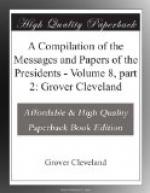But these are all minor points and insignificant questions compared with the great principle which was incorporated by the House in the bill in reference to the use of the Army in time of peace. The Senate had already conceded what they called and what we might accept as the principle, but they had stricken out the penalty, and had stricken out the word “expressly” so that the Army might be used in all cases where implied authority might be inferred. The House committee planted themselves firmly upon the doctrine that rather than yield this fundamental principle, for which for three years this House had struggled, they would allow the bill to fail, notwithstanding the reforms which we had secured, regarding these reforms as of but little consequence alongside the great principle that the Army of the United States, in time of peace, should be under the control of Congress and obedient to its laws. After a long and protracted negotiation, the Senate committee have conceded that principle in all its length and breadth, including the penalty, which the Senate had stricken out. We bring you back, therefore, a report, with the alteration of a single word, which the lawyers assure me is proper to be made, restoring to this bill the principle for which we have contended so long, and which is so vital to secure the rights and liberties of the people.
* * * * *
Thus have we this day secured to the people of this country the same great protection against a standing army which cost a struggle of two hundred years for the Commons of England to secure for the British people.
From this brief review of the subject it sufficiently appears that under existing laws there can be no military interference with the elections. No case of such interference has, in fact, occurred since the passage of the act last referred to. No soldier of the United States has appeared under orders at any place of election in any State. No complaint even of the presence of United States troops has been made in any quarter. It may therefore be confidently stated that there is no necessity for the enactment of section 6 of the bill before me to prevent military interference with the elections. The laws already in force are all that is required for that end.
But that part of section 6 of this bill which is significant and vitally important is the clause which, if adopted, will deprive the civil authorities of the United States of all power to keep the peace at the Congressional elections. The Congressional elections in every district, in a very important sense, are justly a matter of political interest and concern throughout the whole country. Each State, every political party, is entitled to the share of power which is conferred by the legal and constitutional suffrage. It is the right of every citizen possessing the qualifications prescribed by law to cast one unintimidated ballot and to have his ballot honestly counted. So long as the exercise of this power and the enjoyment of this right are common and equal, practically as well as formally, submission to the results of the suffrage will be accorded loyally and cheerfully, and all the departments of Government will feel the true vigor of the popular will thus expressed.




